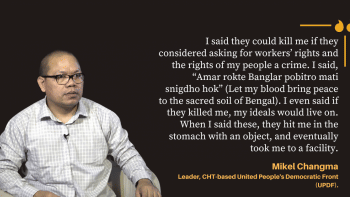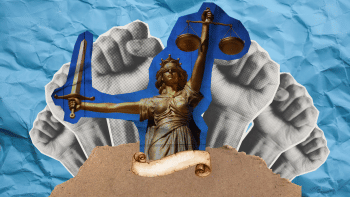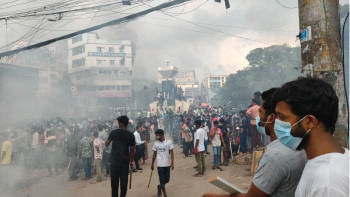‘July victims are entitled to truth and justice’

Barrister Sara Hossain, a Supreme Court lawyer and the honorary executive director of Bangladesh Legal Aid and Services Trust (BLAST,) talks to Tamanna Khan of The Daily Star about how justice can be served to the victims of the July uprising.
What is your take on the wave of murder cases being filed against Awami League leaders and activists for killing people during the uprising?
From July 15 onwards, a number of really serious human rights violations and crimes occurred. These included extrajudicial killings and indiscriminate use of force including live rounds resulting in the deaths and injuries of hundreds of largely peaceful protesters, including children; arbitrary arrests and detentions, many even from their homes; and torture and ill-treatment in custody. People across the country watched these horrific scenes on television or live on the streets. Under Bangladesh laws, these acts constitute serious crimes and rights violations. It is, therefore, imperative that those responsible for these crimes are held to account—either for their direct involvement in them, or for directing, planning or coordinating them.
That's the context of the few weeks from July 15 onwards. But prior to that, for many years, we've seen other kinds of repression as well, including enforced disappearances. It's good to see that one of the first acts of the interim government has been to set up a commission to inquire into the allegations of enforced disappearances over the last 15 years or so.
During this time, there have also been allegations of systemic judicial harassment of individuals exercising their right to freedom of expression through the arbitrary application of repressive laws such as the Digital Security Act (DSA). We have seen a trigger-happy approach to using all other criminal defamation laws. Alongside that, we have seen how the media engaged in orchestrated hate campaigns (sometimes with the complicity of civil society), including against human rights defenders, academics and others. There's a wide range of issues to take on in seeking justice for the victims of the pervasive abuse of the legal process as well as abuse of power that have taken place in recent years.
Currently, we're seeing a wave of cases, all related to the killings that took place since July 16. They all concern allegations of the murder of one or more individuals. Some seem to be framed in similar terms, and are being filed either before courts or the police by private individuals. According to media reports, the cases refer to the instigators of the killings and mention senior political figures and high officials of the previous government. While they characterise some of these persons as "instigators" and "abettors", it's not clear if they identify the person who directly caused the killings and whose actions resulted in the death or injury of a person. In some instances, the media reported on the challenges victim families have faced to actually file a case. All the cases relate to allegations of murder, which is a cognisable offence, i.e. the police have powers to arrest without needing to get a warrant from a magistrate. There does not seem to be any guideline in place to limit the exercise of these powers.
What can the interim government do in this context?
The government may consider setting up one or more designated contact points for people who were victims of violations, or their family members, to seek assistance, information and advice. There have been very positive pronouncements about the formation of a foundation to assist people and the families of those who've been killed, but it may take time for that to be set up. Similarly, the government has announced a significant initiative to provide free medical assistance to those injured in the protests.
There's a fact-finding mission which is starting its work. There's a commission on enforced disappearances. These two bodies will be able to find and record information, produce documents and reports about what happened, and give us a direction on how people can seek protection going forward. But other contact points are needed because arrests, detentions, and torture won't fall into the terms of reference of the inquiry commission. We don't yet know what will be the full scope of the United Nations investigations.
Would the victims and their families get justice from the plethora of murder cases police filed against AL members?
There are murder cases being filed all over the country. Whether cases framed in this way are really serving the needs of the victims is something we need to identify. Victims are entitled to truth, justice, and reparations for the loss of their family members. It will be a great disservice to the victims if the manner of filing or investigating or conducting these cases results in a denial of justice. Under our law, anyone may file a case. However, there could be a process of scrutiny and assessment before further measures are taken.
In contrast, there are reports that some families of the victims of July killings have faced challenges at police stations. Some have had to wait for eight to ten hours at the police station before their cases were lodged. I've seen a recent government order instructing police stations to record people's complaints and FIRs. It would be helpful if more public information is disseminated about the options available for people to seek justice.
What is your take on the police's culture of implicating opposition members by writing fictitious FIRS, as we have seen in connection to some of the cases?
I think the government should look into how these policing practices are being conducted.
After the fall of Sheikh Hasina's government, there were no police on the ground for several days. There was a concern with security, and we all realised that a functional police force is essential. But police malpractices, unfortunately, are very well entrenched in the system. It's not just about the last two months or the last 15 years. For 50 years, we have seen these practices of writing fictitious FIRs, prosecuting so-called gayebi mamla. Sometimes, 1,000 unknown names were put into an FIR.
Now what you're describing, an FIR is written with one set of "cut and paste" sort of formula and it's being applied in a completely different context where everything has changed, but people maybe are just filling in the blanks on what they wrote. That can't be the way to reach a just outcome.
We have to investigate the facts as they are. We have to allow people to speak. With regard to the July killings, for the first time, we have a situation where we have extraordinary amounts of evidence available—huge numbers of eyewitnesses as well as huge quantities of open source material, including videos, captured in mobile phones, or uploaded online. Our laws were changed recently, and video content, if verified, is now admissible as evidence in courts to prove crimes. When we have so much evidence available, we need to gather and preserve it, instead of making up stories.
If the UN is going to investigate the killings of July and early August, then why are these murder cases going forward?
I presume one issue here is that people accused of violations need to be taken into custody, for investigations and inquiries. It's important for the government to use lawful means of taking people into custody.
When General Ershad fell after a popular movement in the 1990s, many people, who were to be brought to account, were detained using the Special Powers Act of 1974, which allows for orders of preventive detention. In 2007-2008, the emergency powers rules were used.
We don't have emergency powers rules now, as there's no state of emergency, but we do have the Special Powers Act. Many of us have spoken for many years about the problems with the Special Powers Act. While we would not like to have it on the books, the Special Powers Act does exist, and it does provide a lawful means of detaining a person. Although it can be challenged and the person will have recourse before the High Court, it gives you a lawful means of detaining somebody. Several lawyers have already commented on this.
There's also Section 54 of the Code of Criminal Procedure that allows you to arrest someone on suspicion of committing an offence. There again, the Supreme Court has very strict guidelines on what needs to be done on making an arrest under Section 54, and those guidelines include informing the arrested person about the reason for their arrest, where they're being taken, and who is arresting them. So long as those guidelines are strictly followed, then a Section 54 arrest could perhaps be made.
So the question is whether it would be better to detain somebody under Special Powers Act or under Section 54, or other available processes, or just following the current process. I think the last thing we want is for the process of justice to be derailed, or in some way tainted, because that would be the worst disservice we could do as a people to the victims of these violations: denying them the opportunity of getting justice.
What is your opinion about the way AL leaders were treated at court premises?
Obviously, it's completely condemnable that any accused person on their way to or in court premises should face any kind of risk, threat or violence.
Court premises need to be secure for everybody involved for every person taking part in the process of justice, whether a judge, court officer, lawyer, witness or observer. However serious the allegations, or how much an accused person may be an object of public hatred or contempt, they must be protected from violence. And law enforcing agencies are responsible for this. Courts also need to request sufficient security and take action against any member of the public who mistreats any person including an accused person in court. It is particular important that lawyers as officers of the court themselves do not contribute to violence or intimidation of anyone else in court.
We have seen scenes of lawyers intimidating people. Again, it may be useful to recall that in the past fifteen years, we have seen many thousands of cases being filed against lawyers who were politically involved or members of the then political opposition.
All kinds of cases were used to imprison or incarcerate them for months at a time. For a whole group of people, including lawyers, who faced that situation over years and felt that they would have no relief, it's understandable that they feel enormous rage and resentment when people involved in denying them their rights are brought in front of them. But what's not acceptable is that any lawyer should lift their hands against another person.
Lawyers also have a responsibility to be part of the process of dispensing justice. So, these scenes of lawyers pushing other people around, lawyers not allowing other lawyers to speak, that's something, we, the community of lawyers, have to take responsibility for.
We have legal regulators, the Bar Council, judges who can hold us to account in the courtroom for our behaviour.
There is a terrible culture that we have seen manifested through different regimes of disregard for the integrity and dignity of people who are accused. Just recall what we all witnessed only a few weeks ago, when. Images of politician Nurul Haque Nur were across the media – he was brought to court after remand in police custody, barefoot, with his body seemed kind of almost folded in half between two police officers who had their arms under him to support him so he could walk forward. He spoke immediately afterwards about the torture that he'd experienced in custody. But as I recollect, no magistrate or court made an order for his immediate medical examination or treatment. No politician spoke out to condemn this and few media houses or organisations took up the issue.
Only a few days after that we saw how Nahid Islam, the current ICT Adviser, was taken into custody by the DB. After his release, he courageously spoke out about torture – and showed the visible and extensive purple and red bruising right down one thigh. Again, no one ordered medical treatment, no court inquired into the issue, no public official at the time even recorded this visible ill-treatment.
Two wrongs do not make a right. These practices of ill-treatment and torture of people in custody have been ongoing in our country for years, not only for two months or 15 years. People—whether they're in the police or the security forces—have not been held to account for the violence that they perpetrate on those they take into custody. The government must demonstrate how it will chart a different course for the future, and we need to see concrete action – for the protection of victims and for holding to account those who mistreat people in custody.
Is there anything else you would like to add?
During the protests, students as well as young lawyers played an extraordinary role in trying to ensure safety on the ground for people, and support for those facing arbitrary arrest or detention or beatings and assault by police and others. I wonder if, at this transitional moment, they can continue to play a role in ensuring safety and security in court premises, and monitoring and observing the whole process of seeking justice for the victims. Our courts have not always welcomed trial observers – indeed many have restricted observers, particularly international observers, whether from the ICT, or ordinary courts, but this is the time to think about making this possible, if we really want to reform our justice system and make it more participatory and more accountable.
Courts are meant to be open. We need observers, not only during trials, but in the pre-trial stage, as the accused are brought to court, and also earlier to ensure victims can seek justice without intimidation.
In earlier periods of transition, for example when General Ershad fell after a people's movement, he was initially tried not for murder, but for illegal possession of arms. The trial was held in a separate building far away from the District Court and High Court, dedicated for the purpose, with security and a pass system for entry. But the court was not closed, journalists, observers, the ordinary public could enter.
Now that we have laws that allow for virtual court hearings, it may also be possible to consider holding some hearings online. Of course, the law requires that any arrested person must be produced before a court within 24 hours, and this must be ensured. But some online hearings – provided that they are open, ie ensure full access for lawyers, the parties, and observers - could be considered by the authorities.
Follow The Daily Star Opinion on Facebook for the latest opinions, commentaries and analyses by experts and professionals. To contribute your article or letter to The Daily Star Opinion, see our guidelines for submission.

 For all latest news, follow The Daily Star's Google News channel.
For all latest news, follow The Daily Star's Google News channel. 







Comments